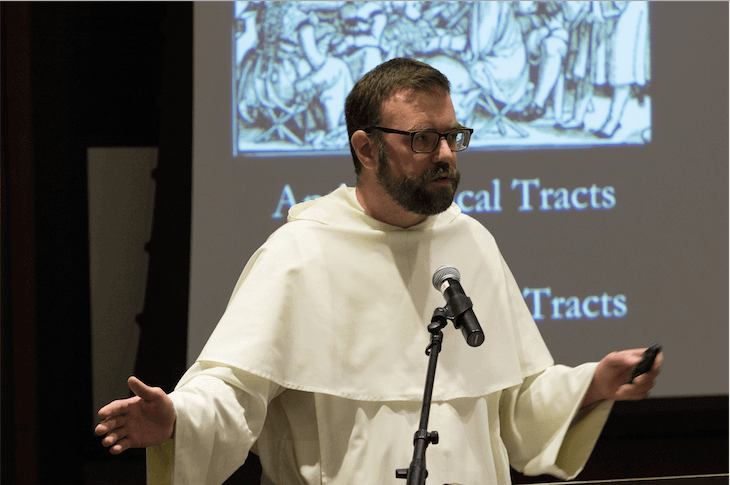by The Cowl Editor on April 4, 2019
On-Campus
by Catherine Goldberg ’20 A&E Staff
Brother Jordan Zajac ’04, O.P., Providence College alumnus and now Friar, gave a talk at the Humanities Forum on the role of virtue in taverns in Shakespearean plays on Friday, March 29 in the Ruane Center for the Humanities. Brother Jordan grew up in New Bedford before attending PC to major in English and minor in political science. From there, he went to the University of Virgina to receive a master’s degree, finally attending the University of Massachusetts Amherst to get his Ph.D. in Shakespearean Drama. He joined the Order of Preachers at the Dominican House of Studies in 2013.
Brother Jordan centered his talk on Shakespearean times—16th century London, United Kingdom. Plays were popular culture during this time, and social groups formed revolving around them. All types of people were welcomed to these plays, whether groundlings (commoners who sat at the lower level among those in their class), or the wealthy (who sat in expensive seats in boxes above).
During this time, drinking was commonplace in London. For this reason, Shakespearean plays often took place in the alehouse. Brother Jordan quoted a German writer who came to London and said he had “never seen more taverns and alehouses than in London.” He went on to say, “Where there are theaters, there are taverns.”
From this, Brother Jordan gathered that Shakespeare, having read Aristotle’s Nicomachean Ethics, intentionally used alehouses and taverns as main settings in his plays to promote the virtue of temperance. Staging scenes in alehouses was a completely new idea, and Shakespeare took precisely these circumstances as a model, not to follow upon the drunkenness which took place in the taverns, but rather to present men in the ugliness of their vices in order to make others abhor them and make them hate the sins themselves.

One of the examples given by Brother Jordan was the figure of Falstaff in Henry IV. He describes Falstaff as an “appetite with legs”—someone who is bold, eats too much, and drinks too much. Falstaff is one of Shakespeare’s most memorable characters. One of his companions in Henry IV is the Prince who is a virtuous foil to Falstaff’s vices. Unlike Falstaff, the Prince is able to resist bodily pleasures. He does not fall into temptation, but rather, he is aware of it. The Prince recognizes that not everything revolves around sensual pleasure and is able to pursue human desires temperately.
Brother Jordan concluded by tying this into Aristotle’s philosophical description of happiness, opposing what most people think happiness entails, which is sensual pleasure; this conception of happiness makes people slaves to their desires. Rather, Brother Jordan describes the happy person as one who pursues sense pleasures rationally. He says, “to be drunk is to hinder what makes us unique in our rationality. It makes us less.”
As an alumnus, Brother Jordan is aware of the drinking culture at PC. Jokingly, he concluded by comparing students to Falstaff and reminded us to try and live temperately in our popular drinking culture.